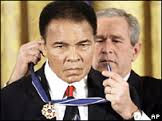Muhammad Ali, who gave up his boxing championship to oppose
the Vietnam War, has died at the age of 74.
Ali’s death comes at a time when sports have become so
corrupted, there is widespread cheating, and doping. He gave it all up because
he didn’t want to become part of the U.S. war machine and kill people he didn’t
even know. He probably could have joined and been given some behind-the-lines
job. But he said no.
Only Jesse Owens, who embarrassed Hitler at the 1936 Berlin
Olympics winning four gold medals, came close to matching what Ali did.
But Owens was considered a hero. Ali lost much of that for
years because he refused to go into the army and fight in Vietnam. Even then,
millions who opposed the war considered him a hero.
For three years he was not allowed in the ring.
“I ain’t got no quarrel with them Viet Cong. No Viet Cong
ever called me nigger,” he said.
The war was the most divisive event in American history
since the Civil War. Some celebrities felt it was their duty to serve. Others
were able to get deferments.
As the nation changed its mind on Vietnam, boxing
authorities were forced to allow him to box again.
Time after time Ali upset men expected to crush him.
In 1965, Sonny Liston was considered unbeatable as he drove
around my hometown of Denver. Cops often followed and it wasn’t because they
admired Liston. He had been in prison for robberies in his native St. Louis,
Mo.
Official statistics said Liston was 6 foot 5 and 219 pounds.
He was called the bear. Ali was more a natural athlete and listed at
6 foot 3 and 190 pounds but in the ring he appeared taller than Liston.
Sometimes he stood on his toes.
Everyone thought Liston would dispatch Ali in a round or
two.
Ali said, “You can’t hit what you can’t see” and that he
would “float like a butterfly and sting like a bee.”
In fact, more than once it was hard to say exactly when Ali
had scored the winning punch.
Liston spit out his mouthguard at the beginning of the
seventh round and the referee declared Ali the winner.
The man sometimes called “the Louisville Slugger,” the same
name for a popular baseball bat, died Saturday in after suffering from
Parkinson’s for years. His doctors believed all the punches he took shortened
his life.
Born in Louisville, Kentucky, he was named Cassius Clay. He
called himself “the greatest.” But his braggadocio was well-received because
his face made it seem so genuine.
When he was allowed to resume fighting he had lost a bit of
his speed and suffered his only two professional losses.
In 1975, the year the Vietnam War ended, Ali became a
Muslim.
The Liston victory was not his only upset. He beat George
Forman in “the Rumble in the Jungle” in Kinshasa.
He three professional fights, one to Joe Frazier and one to
Ken Norton. He beat both of them in rematches, including the
“thrilla in Manila” when he sort of bear-hugged Frazier using his “rope-a-dope”
style.
He retired in 1981 after losing to lightly regarded Trevor
Berbick.
Ali was directed to boxing by a cop, Joe E. Martin. The
officer found the 12-year-old Ali, then Cassius Clay, fuming because his
bicycle had been stolen. Martin told him he needed to learn how to box if he
was going to “whup” anybody.
Ali went on to win numerous amateur titles before winning
the light heavyweight gold at the 1960 Olympics in Rome.
He was awarded the Presidential Valor award in 2005. Ali is
survived by his fourth wife, Yolanda ("Lonnie") Williams. He had nine
children.


No comments:
Post a Comment